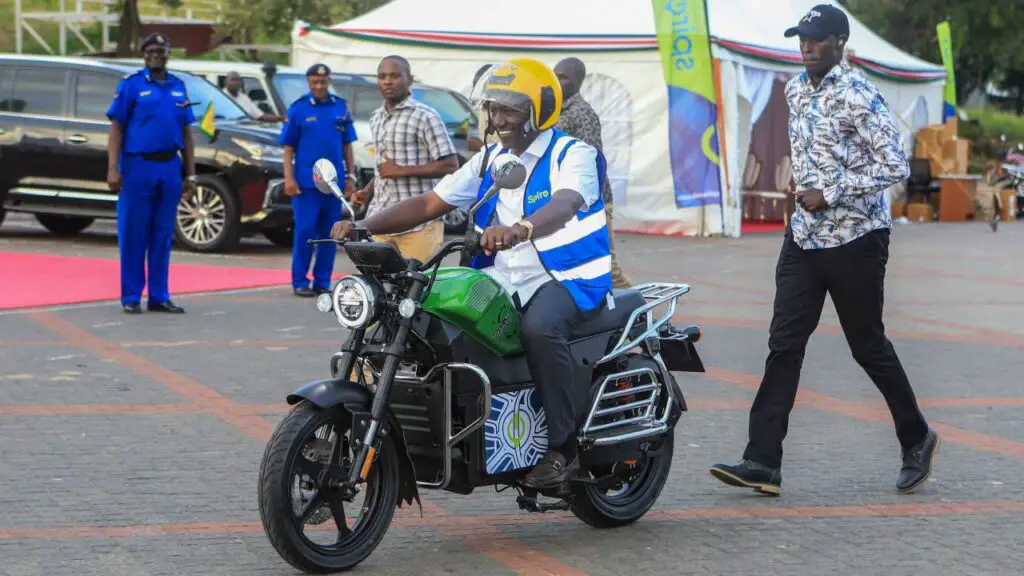- Kenya has partnered with Spiro, Africa’s first electric bike maker, to address the rising concern of high fuel costs.
- President William Ruto plans on setting up 3000 battery charging and swapping stations in Kenya.
- Today, the UN Environment Program is active in nine African countries.
As the world steadily shifts into the new industrial age, many governments have taken the necessary steps to ensure they do not miss out. Among the wave of ingenuity, the 4th industrial revolution has brought the growing need for alternative energy sources.
As a result, the age of electronic vehicles is upon us, and the Kenyan government has pioneered this new initiative. President William Ruto recently announced an electronic bike movement to completely redefine transportation for the nations.
The government has announced a new partnership with the African startup Spiro to battle the high fuel cost by introducing electrical motorcycles.
Kenya partners with e-bikers firm Spiro
Energy is a must-have commodity to ensure the survival of any society and age. Throughout all four industrial revolutions, industries have developed new forms of energy, each surpassing its predecessor. In today’s era, the age of carbon emissions is steadily becoming a legacy activity as more organizations have opted for renewable energy.
Despite its contribution to man’s evolution, traditional energy sources have become more of a liability for most economies. Its finite sources and harmful aftereffects have proven more of a loss. Thus many activists and eco-friendly organizations bombarding most organizations with lawsuits and boycotts.
To ensure progress, realize profit, and avoid lawsuits, many organizations have turned to electric-powered appliances, more so the Transport industry. The concept of Electric and AI-driven vehicles has grown over the years, and Kenya has made it clear it wishes to change with time. Dr Ruto recently announced his collaboration with Spiro to kickstart an E-bike movement.
Today, the Boda Boda franchise is one of the big industries within the markets. About two million motorbikes are on the road in Kenya today. Organizations and self-employed entrepreneurs are using motorcycles to create an ample market in Kenya. With the transition to electric cars, it was only a matter of time before Kenya stepped into the limelight.
Read Also: Africa’s struggle for tech-enabled economic growth.
President Ruto said, “The adoption of electric mobility is a high-priority intervention to address the challenges of pollution, adverse health effects, and fuel costs.” According to the president, Kenya aims to phase out the combustion engine-powered motorbikes to a more eco-friendly alternative.
Furthermore, the high fuel cost has significantly strained the country’s financial budget. As a result, its high fuel cost has affected their commodities, raising the cost of living throughout the country.
The problem of high fuel costs and tax inflation caused a mass panic among its citizens. In May 2023, the entire country protested due to the high cost of living, causing a heavy backlash on its current governments.
Kenya has partnered with Spiro, Africa’s first electric bike manufacturer, to address the rising concern of high fuel costs. According to the announcement, Spiro has over 10,000 e-bikes operational across Africa. Benin, Togo, Rwanda, and Uganda are among the first testing grounds for their e-bike movements.
Dr Ruto plans on setting up 3,000 battery charging and swapping stations in Kenya. Additionally, Kenya has taken active steps to generate 100 per cent of its energy from renewable sources. He further estimated that by 2030, the country will depend on hydroelectric, geothermal, solar, and wind power.
Africa’s energy transitions
Many might claim that the current energy transition of most African countries stems from the failures of South Africa’s energy industry. Unfortunately, South Africa is significantly underutilizing most of its services, despite being Africa’s most industrialized nation. The consistent power failures are a testament to the finite capabilities of traditional energy sources.
The high fuel costs have affected several economies in Africa, causing a mass movement into renewable energy. In addition, the UN has also actively participated in ensuring that Africa smoothly through several programs.
Today, the UN Environment Program is active in nine African countries, each working to introduce electric-powered vehicles. The countries include; Ethiopia, Togo, Kenya, Rwanda, Uganda, Burundi, Madagascar, Sierra Leone, and Tanzania.
Africa is rapidly urbanizing, and the pressure of better infrastructure is steadily growing. Currently, 10 percent of Africa’s total greenhouse gas emissions are attributed to transportation. With the growing economies in Africa, this percentage will rise by 2040. In addition, a majority of Africa’s Electric Vehicle companies serve the continent’s private sector.
For instance, Roam, a Kenyan-Swedish startup, identified a niche in the E-bike movement within Africa’s market. Roam offers the conversion of current cars to electric power and has two main commercial tenets.
Other commercial transport organizations have analyzed the high fuel costs in Africa and are taking steps to introduce electric vehicles.
Read Kenya’s President Ruto Turns West for FDI and Partnerships
Uber stirs Africa’s e-bikes market
Uber disclosed the introduction of an electrical motorbike named the One Electricity in the Kenyan Market. Frans Hiemstar, director and regional general manager of Uber, said, “Now is the time to take solid steps that enhance sustainable practices, and as a business, we are committed to being part of the collective efforts to reduce the carbon footprint. Through the launch of Electric Boda on our platform, we are proud to provide an option for emissions-free mobility in Kenya. This launch also supports our global efforts to become a zero-emissions platform by 2040.”
With an organization like Spiro, Roam, and Uber participating in Africa’s E-bike movement, it’s only a matter of time before the entire continent goes electric.
